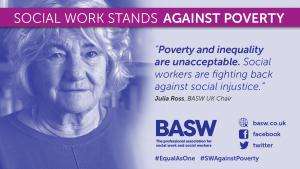BASW advocates for an Essentials Guarantee to prevent poverty-related health harms
The coalition of organisations have written to the Prime Minister, Rishi Sunak expressing deep concern that many people struggling to make ends meet are being forced to forgo essentials due to rising costs, leading to poorer health and wellbeing. They also warn that this will likely increase demand on health and social care services, which are already stretched to breaking point.
The letter therefore urges Mr Sunak to acknowledge this as a health emergency and take immediate preventative action by introducing an Essentials Guarantee to protect the nation’s health now and in years to come.
The Essentials Guarantee would embed in our social security system the widely supported principle that, at a minimum, Universal Credit should protect people from going without essentials. It would enshrine in legislation:
- An independent process to regularly determine the Essentials Guarantee level, based on the cost of essentials (such as food, utilities and vital household items) for the adults in a household (excluding rent and council tax);
- That Universal Credit’s standard allowance must at least meet this level; and
- That deductions (such as debt repayments to government, or as a result of the benefit cap) can never pull support below this level.

BASW is campaigning for the UK Government to take much stronger action to protect those on the lowest incomes from the sharpest effects of the cost-of-living crisis. Find out more about our campaign- Social Work Stands Against Poverty.
Read the full letter below.
______________________________
Dear Prime Minister,
It is wrong that, despite living in one of the wealthiest countries in the world, there are people in the UK unable to afford the essentials we all need to get by, such as food, household bills and essential travel costs.
As health and social care professionals and health charities, we are seeing too many living with the effects of going without these essentials.
Every day, we see people unable to afford enough food because their incomes are simply too low. We hear heart-breaking stories from people who are forced to miss hospital appointments because they can’t afford the bus fare, from people who are missing or reducing their medication because they can’t afford the prescription, or from people with diabetes who risk serious complications from going without food. Many conditions people present with, like asthma, are exacerbated by the poor state of their home, which should be a place of safety, which they cannot afford to maintain or even heat properly. Many of the people we help and care for say the stress and anxiety of getting behind on bills is taking a serious toll on their mental wellbeing.
These are just some of the countless examples we have of how seriously this scarcity is impacting people’s physical and mental health.
These impacts will be increasing demand on health and care services, now and in the future, when these services are already stretched to breaking point. What’s woefully missing is appropriate, preventative action.
Our social security system should offer adequate support to anyone in need of help, but right now it’s not providing enough income to cover the cost of life’s essentials. According to research from the Joseph Rowntree Foundation, around 9 in 10 low-income households in receipt of Universal Credit are going without at least one essential, such as food or a warm home, a number that has not budged since they first started tracking in May 2022. The basic rate of Universal Credit must at least cover life's essentials, with support never being pulled below that level.
Together we’re calling on you to acknowledge the cost-of-living emergency is a health emergency and adopt the Essentials Guarantee to protect the nation’s health now and in the years to come.